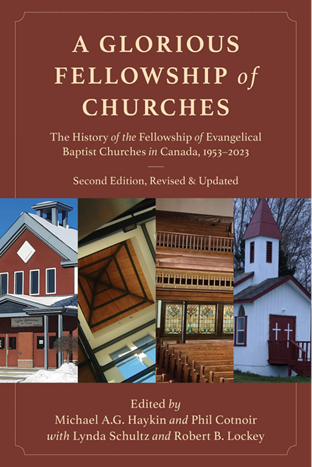Phil Cotnoir shares reflections from documenting the history of the Fellowship of Evangelical Baptist Churches in Canada.
Life has some special moments. For me, one of them was the first time I got to hold a book I had worked on for over a year. Not quite as special as holding my newborn babies, that’s true, but any author will tell you there’s a striking parallel when you hold in your hands this thing you helped bring into the world.
The book I’m referring to is A Glorious Fellowship of Churches, which tells the history of the Fellowship of Evangelical Baptist Churches in Canada, or the Fellowship for short. This was a collaborative effort with the esteemed historian, Dr. Michael Haykin.
This was a special project for me to work on because the book’s first edition, published in 2003, was worked on by my mother, Ginette Cotnoir, who died of cancer in 2012 at the age of 54. She had worked on the chapter dealing with Quebec.
For the second edition, my main writing assignment was updating that chapter to cover the time period from its initial release in 2003 to the current day (2023). This meant research, interviews and thorough editing so the narrative voice of the chapter was consistent and enjoyable to read. I also worked on editing the other chapters.
Working on this project gave me new perspectives on historical roots, those who came before us, and how this helps us live wisely for God’s kingdom.
The importance of roots
If there is a consistent weakness in modern evangelicalism, it is historical rootlessness. Many of us are simply not taught where we came from. This partly explains the exodus from Evangelicalism to Roman Catholicism and Eastern Orthodoxy – branches of Christianity which emphasize their historical continuity far more than we do.
This rootlessness has driven a lot of my own reading over the last two decades. I’ve become convinced that within historic evangelical Protestantism, which is in continuity with the best of the ancient and medieval church, we have abundant resources for growing deep, healthy roots. So, the problem is not a lack of resources but the prevailing alienation from those resources and, what is worse, an all-too-prevalent attitude that assumes the modern church has no need for all that old stuff.

Working on this book reminded me in a fresh way how stabilizing and encouraging it can be to discover one’s roots. The history of the churches that make up the Fellowship, not to mention other evangelical denominations in Canada, in some cases go back to the 18th and 19th centuries. The list of faithful men and women who built and sustained all those churches is long, and we shuffle onto the stage in their wake, holding their props and seeking to carry on the faithful work they left us. Each new generation receives this legacy from the one before. And that, if it sinks down deep, helps us chart a path that is straight and true.
The Nearly-Forgotten Faithful
There are a few names in church history that everybody knows – Augustine, Aquinas, Luther, Whitefield, Spurgeon and Billy Graham. We continue to read and write books about them because of their compelling personalities and the momentous nature of their ministries. But for each of us, there is another, closer set of ancestors – locally, regionally, and nationally – who more directly shaped the church family in which we find ourselves. It is good and right for us to make the effort to remember these men and women. Unlike with a Luther or an Augustine, if we don’t remember them, no one will. As the spiritual descendants of these saints, it is our responsibility to remember them, to rehearse the works God did through them and to honour their memory. This seems to me to flow naturally out of the repeated chorus we find throughout the Old Testament to remember the works of God in previous generations.
I’m so glad to have been a part of writing a history of the Fellowship, for I think it helps preserve the health and future of that movement of churches. It helps us remember who we are, where we came from and what we’re a part of. The narrower scope means the book won’t sell many thousands of copies, that’s true, but that focus also means it has the potential to have a deeper impact on those who are a part of the Fellowship.
The Forgotten Faithful
But here is the reality we all must embrace: the vast majority of God’s people are, in a human sense, utterly forgotten within a short period of time after their death. This was a curious effect of my research and reading. As I came across name after name I had never heard of before, it impressed upon my mind the reality that there was simply no end to the names or the stories. I could never hear them all, know them all or capture them all rightly in words. And yet each of them played their parts through prayer and service and teaching and outreach and building and sowing and reaping, no less than anyone else.
Friends, this is going to be the case with you and me, almost certainly. Few will make it into whatever history books are written, and that’s okay. As I heard it put many years ago, there will be only one name lifted high in the new heavens and new earth, and it won’t be yours or mine. The sooner we get on board with that, the better.
Phil Cotnoir is a writer and editor living in St-Polycarp, Quebec. A previous version of this post first appeared on Phil’s personal blog. If interested in purchasing a copy of the book, see this website: fellowship.ca/GloriousFellowship70thAnniversaryEdition.